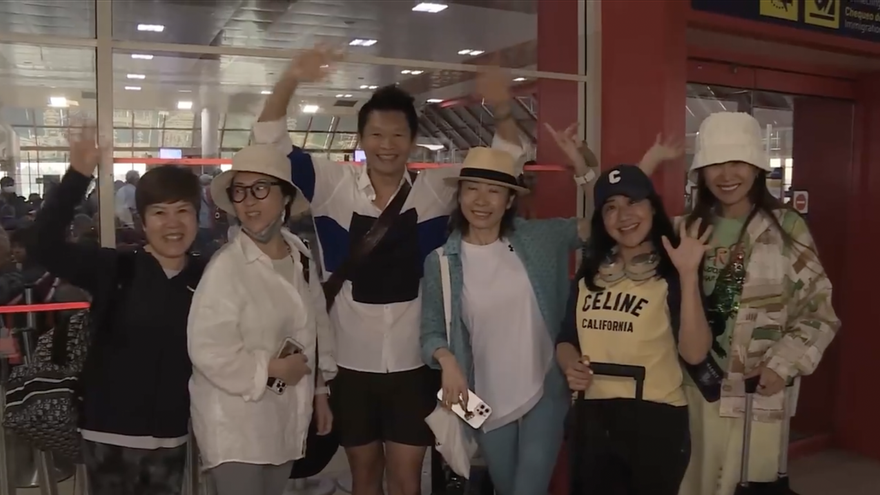
![]() 14ymedio, Havana, 16 August 2023 — The first group of Chinese tourists traveling to Cuba since the beginning of the coronavirus pandemic arrived at Havana airport on Monday. The Island, which last received visitors from the Asian country in 2020, has been preparing the ground for months, not only for the massive arrival of vacationers but also for entrepreneurs and investors.
14ymedio, Havana, 16 August 2023 — The first group of Chinese tourists traveling to Cuba since the beginning of the coronavirus pandemic arrived at Havana airport on Monday. The Island, which last received visitors from the Asian country in 2020, has been preparing the ground for months, not only for the massive arrival of vacationers but also for entrepreneurs and investors.
The Cuban authorities see in China, which came to occupy the 14th place in the list of countries sending tourists to the Island in 2019, a double opportunity. First, China’s “large population” guarantees continuous and numerous visits. Second are the commercial privileges offered by Beijing, with which Havana maintains “good diplomatic relations,” said Elizabeth Vela, Cuban Ministry of Tourism advisor for Asia and the Pacific.
The official explained in an interview with the Xinhua agency that Cuba plans to double the number of tourists from China in a short time, so she has put her efforts into promoting its “attractiveness.”
The new promotional plans are aimed at a key market, that of young Chinese, “who are looking for longer, different trips” and who, according to Vela, are looking for more striking options than Europe or Southeast Asia.
The Island offers the new traveler a “tourism of nature, culture and health,” something that, Vela estimates, will be well received by Asians, who “not only see a country of sun and beach but also want to understand its history, culture and heritage.”
Huo Yaofei, one of the tourists who arrived in Havana from Beijing on the inaugural flight, expressed his enthusiasm for traveling to a country he considers exotic. “Cuba has many good things. It’s a legend, unique, with the best music, dance, food, tobacco, rum, everything,” he said, making it clear what kind of experiences he is looking for.
At the end of July, a delegation of 16 businessmen traveled to Havana in order to attract foreign capital and encourage visits. The guests visited the main tourist centers (Varadero, Cienfuegos, Trinidad) and were offered a portfolio of investment opportunities at the end of the trip.
Other initiatives included sending a “promotional ambassador” to China and the creation of the Cuba Única campaign, an initiative of the Ministry of Tourism to “show the world the wealth and diversity of the Antillean nation.”
Since Cuba noticed the high profitability of Asian tourism in Europe, the Island’s campaigns to sell itself as an ideal destination have not ceased. China has become, in a few years, the most important tourist market in the world, not only because of the potential number of travelers it contributes (about 200 million of its inhabitants visited foreign countries in 2020), but because, on average, they spend a good deal of money.
Before the pandemic, in 2019, the International Tourism Organization published a report indicating that the Chinese left a total of 276 billion dollars on their trips abroad, almost double that of the Americans, second in the ranking, with 144 billion.
However, even if the Chinese like to spend generously, they will be able to do little on an island where the offer of all kinds of products is almost non-existent, especially outside of hotels where they will not even be able to have reliable Internet service.
In its accelerated debacle, Cuba has resorted to all kinds of techniques to replace the travelers – usually Europeans – that it is losing. In this sense, relations with Beijing represent an opportunity that it cannot miss.
An even more desperate measure has been the attempt to attract Russian tourists. In the best years of the sector for the Island, travelers from this country grew exponentially (40% in 2017 compared to the previous year). However, the exploitation of this market has proven to be stagnant, and the decline began before the pandemic and was given the dearth blow after the invasion of Ukraine. The trend over the last four years has been downward.
Even so, the Government continues to promote travel through all possible channels to reach Russian travelers. The Aeroflot Group announced on Tuesday the establishment of a new air route between Moscow and Havana, in charge of one of its subsidiary companies, in addition to the one that already existed between the Russian capital and Varadero. The Rossiya airline will operate flights beginning December 24, twice a week, on Wednesdays and Sundays.
Translated by Regina Anavy
____________
COLLABORATE WITH OUR WORK: The 14ymedio team is committed to practicing serious journalism that reflects Cuba’s reality in all its depth. Thank you for joining us on this long journey. We invite you to continue supporting us by becoming a member of 14ymedio now. Together we can continue transforming journalism in Cuba.
